Hey there, fellow chicken lovers! If you’re anything like me, you probably treat your flock like family, always looking for ways to keep them happy, healthy, and well-fed. I’ve spent countless hours researching the best foods for my feathered friends, and one question that kept popping up was, “Can chickens eat oats?” I was curious, too, so I decided to dive deep into the topic and share my findings with all of you.
In this article, we’ll explore the nutritional benefits of oats, the different types of oats suitable for chickens, and how to safely incorporate them into your flock’s diet. Whether you’re a seasoned chicken owner or just starting your backyard chicken journey, this comprehensive guide will help you make informed decisions about feeding oats to your chickens.
So, let’s embark on this oat-filled adventure together and discover if these wholesome grains are a good fit for our feathery friends. Grab your favorite mug of tea or coffee, and let’s get started on this cluck-tastic journey!
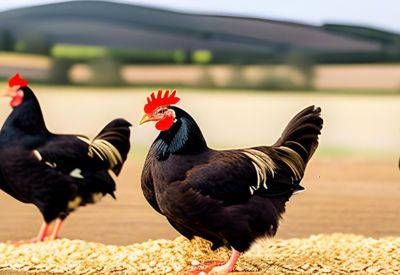
Can chickens eat oats?
So, can chickens eat oats? The answer is a resounding yes! Chickens can eat oats, which can be a nutritious and delicious addition to their diet. Oats are a versatile grain that provides essential nutrients like protein, carbohydrates, and healthy fats. They are packed with vitamins and minerals and contain fiber, which can help support your chickens’ digestive health.
However, it’s essential to remember that oats should not be the primary food source for your chickens. Instead, they should be offered as a supplement to their regular diet, ensuring that your flock receives a balanced and varied mix of nutrients. By incorporating oats in moderation, you can provide your chickens with a tasty and healthy treat that supports their overall well-being.
[ChickenAffiliate]
Nutritional Benefits of Oats for Chickens
First, let’s look at the nutritional goodness oats can bring to your chickens’ diet.
Macronutrient content
- Protein: Oats contain a decent amount of protein (around 16-17%) which can contribute to your chickens’ daily protein needs. Although oats alone can’t provide enough protein for laying hens, they can supplement their diet.
- Carbohydrates: Oats are an excellent source of carbohydrates, giving your chickens the energy they need to go about their daily activities, like foraging, scratching, and laying eggs.
- Fat: Oats have a low-fat content, but the fats they do contain are mostly healthy unsaturated fats. This can help maintain your chickens’ overall health without the risk of weight gain.
Micronutrient content
- Vitamins: Oats are packed with essential vitamins, such as B vitamins and vitamin E. These vitamins play a vital role in maintaining your chickens’ overall health and well-being.
- Minerals: Oats contain essential minerals like manganese, magnesium, and zinc. These minerals help support various bodily functions and keep your chickens in tip-top shape.
Fiber content and digestion
Oats are rich in soluble and insoluble fiber, which can help maintain your chickens’ digestive health. While chickens can’t process fiber as efficiently as humans or other animals, a moderate amount of fiber in their diet can still be beneficial.
Types of Oats Suitable for Chickens
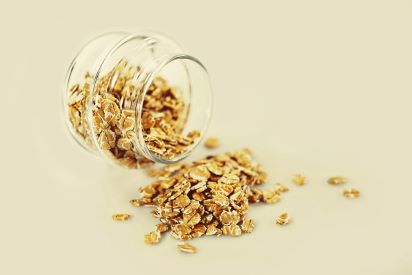
Several types of oats are available, and it’s essential to know which ones are best suited for your chickens.
Whole oats
Whole oats are the least processed form of oats and retain their outer husk. While chickens can eat whole oats, being cautious is essential, as the husks can cause choking hazards. Providing these oats in small quantities or mixed with other grains is best.
Rolled oats
Rolled oats are whole oats that have been steamed and rolled flat. This process makes them easier to digest for chickens, and they’re a popular choice among chicken owners.
Steel-cut oats
Steel-cut oats are whole oats chopped into smaller pieces using steel blades. These oats can be fed to chickens, but they may require soaking to soften them, making them easier to digest.
Instant oats
Instant oats are the most processed form of oats, and they’re not ideal for chickens. They often have added sugars, flavors, and preservatives, which are unsuitable for your chickens’ health.
How to Feed Oats to Chickens
Now that you know what oats your chickens can eat, let’s discuss how to incorporate them into their diet.
Incorporating oats into their existing diet
The easiest way to start feeding oats to your chickens is by mixing them with their existing feed. Remember, oats should only make up a small portion of their diet, so add just a few tablespoons of rolled or steel-cut oats to their regular feed.
Soaking and fermenting oats
Soaking oats overnight in water can help soften them, making them more comfortable for your chickens to eat and digest. To ferment the oats, soak them for a few days, allowing the water to turn slightly cloudy. Fermenting oats can provide additional probiotic benefits to your chickens’ digestive systems.
Mixing with other grains and seeds
You can create a wholesome grain mix for your chickens by combining oats with other grains such as wheat, barley, and corn. Additionally, you can add sunflower or pumpkin seeds for added nutrients and variety.
Creating homemade oat-based treats
For a special treat, you can make oat-based snacks for your chickens by combining rolled oats with ingredients like yogurt, fruits, or vegetables. This can be a fun way to bond with your chickens and provide them with a nutritious snack.
Precautions and Potential Risks of Feeding Oats to Chickens
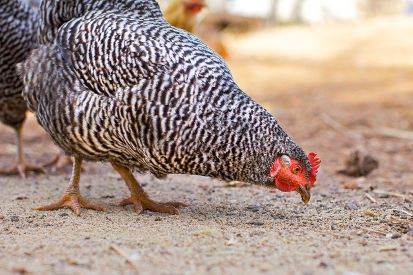
Before you start feeding your chickens oats, you must be aware of some potential risks and precautions.
Overfeeding and nutritional imbalances
Overfeeding oats can lead to nutritional imbalances, as oats don’t provide all the necessary nutrients your chickens need. Always ensure that oats make up no more than 10-15% of your chickens’ diet.
Choking hazards with whole oats
As mentioned earlier, whole oats can pose choking hazards due to their outer husk. Opting for rolled or steel-cut oats or providing whole oats in limited quantities is best.
Ensuring a proper calcium-to-phosphorus ratio
Oats contain a higher phosphorus content compared to calcium. This can lead to an imbalance in your chickens’ calcium-to-phosphorus ratio, which is crucial for healthy egg production and bone health. To avoid this, ensure your chickens have access to a separate calcium source like oyster shells or crushed eggshells.
The impact of uncooked oats on digestion
Uncooked oats, especially steel-cut oats, can be difficult for chickens to digest. Soaking or fermenting oats before feeding can help mitigate this issue.
Environmental Benefits of Feeding Oats to Your Chickens
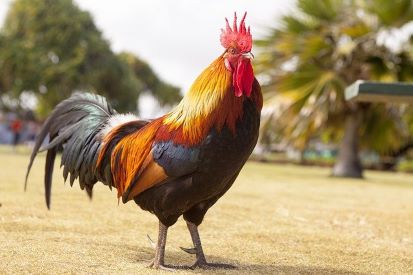
Sustainable farming practices
Oats are a relatively sustainable crop, requiring less water and fewer pesticides than other grains such as corn and soy. By incorporating oats into your chickens’ diet, you’re supporting more environmentally friendly farming practices, which can help reduce the overall ecological footprint of your flock.
Local sourcing
If you have access to locally grown oats, feeding them to your chickens can further reduce your environmental impact. Purchasing oats from local farmers helps support your local economy and reduces the carbon footprint associated with the transportation of food.
Crop rotation and soil health
Oats are often used in crop rotation systems, as they help to suppress weeds and maintain soil fertility. By supporting oat cultivation, you indirectly promote healthier soil and more sustainable agriculture practices.
Frequently Asked Questions
Can chickens eat oatmeal?
Yes, chickens can eat cooked oatmeal. However, feeding them plain oatmeal without any added sugar, salt, or flavorings is essential. Oatmeal can be a warm and comforting treat for your chickens, especially during cold weather.
How much oats should I feed my chickens?
Generally, oats should make up no more than 10-15% of your chickens’ diet. This ensures they receive a balanced and varied diet with all the essential nutrients.
Can baby chicks eat oats?
It’s best to avoid feeding oats to baby chicks, as their digestive systems are not yet developed enough to handle grains. Stick to specially-formulated chick starter feed until they’re old enough to transition to a more varied diet.
What Other Food Can Chickens Eat Apart from Oats?
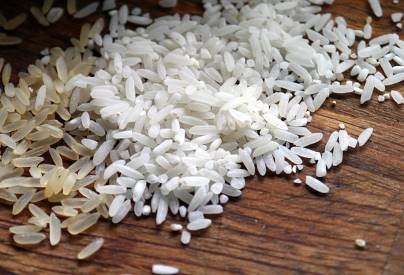
Oats are just the tip of the iceberg when providing your chickens with a varied and nutritious diet. A whole world of other grains, seeds, and legumes can be fed to your flock, each offering its unique set of benefits. In this section, we’ll explore five additional food items – beans, rice, quinoa, lentils, and chickpeas – that can be a fantastic addition to your chickens’ diet. Let’s dive in and discover the nutritional benefits of these wholesome foods for your chickens.
Beans
Beans are an excellent source of protein, fiber, vitamins and minerals for your chickens. However, it’s crucial to remember that raw or undercooked beans contain a toxic substance called lectin that can harm chickens.
Always cook beans thoroughly before feeding them to your flock, and serve them in moderation to avoid any potential digestive issues.
Read More: Can Chickens Eat Beans? A Guide To Feeding Chickens Legumes
Rice
Rice, particularly brown rice, can be a healthy and nutritious addition to your chickens’ diet. Brown rice is rich in vitamins, minerals, and fiber, making it a fantastic energy source for your flock.
Like oats, you must avoid feeding your chickens rice with added salt, sugar, or seasonings. Cook the rice thoroughly and cool it before serving it to your chickens.
Read More: Can Chickens Eat Rice? The Truth About This Common Grain
Quinoa
Quinoa is a nutrient-dense pseudo-grain that has gained popularity in recent years, and it can be a great food for your chickens. It’s packed with protein, essential amino acids, vitamins, and minerals, making it a fantastic supplement to their diet.
Before feeding quinoa to your chickens, cook it thoroughly and rinse it well to remove any bitter saponins that may be present.
Read More: Can Chickens Eat Quinoa? The Superfood Boost Your Chickens Need
Lentils
Lentils are another protein-rich legume that can be a beneficial addition to your chickens’ diet. They’re also an excellent source of fiber, vitamins, and minerals. Just like beans, cooking lentils thoroughly before feeding them to your chickens is essential.
Cooked lentils can be mixed with other grains or seeds to create a diverse and nutrient-dense meal for your flock.
Read More: Can Chickens Eat Lentils? 5 Awesome Benefits
Chickpeas
Chickpeas, also known as garbanzo beans, are versatile and nutritious legumes that can be fed to your chickens. They’re rich in protein, fiber, vitamins, and minerals and can help support your chickens’ overall health.
As with other legumes, cook chickpeas thoroughly before offering them to your flock. You can even mash cooked chickpeas to create a tasty and easy-to-eat treat for your chickens.
Read More: Can Chickens Eat Chickpeas? Benefits & Tips For A Healthy Flock
Can chickens eat oats – final thoughts
In conclusion, our feathery friends can certainly enjoy the wholesome goodness of oats as part of their well-rounded diet. We’ve learned that oats are rich in essential nutrients like protein, carbohydrates, and healthy fats and provide valuable vitamins, minerals, and fiber to support our chickens’ overall health. From whole oats to rolled oats and steel-cut oats, there’s an oat type suitable for every flock.
So, treat your chickens to some tasty oats, but always remember to do so in moderation. By keeping their diet balanced and diverse, we can ensure our beloved backyard companions continue to thrive, lay delicious eggs, and bring joy to our lives. After all, happy chickens make happy chicken owners, and that’s what it’s all about!
Related Articles:
